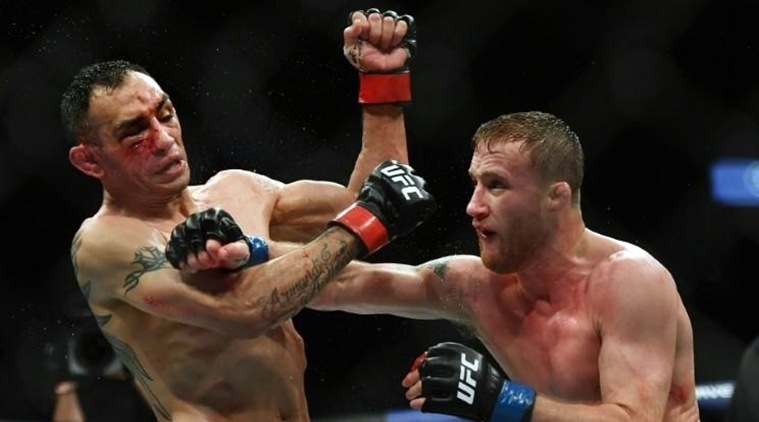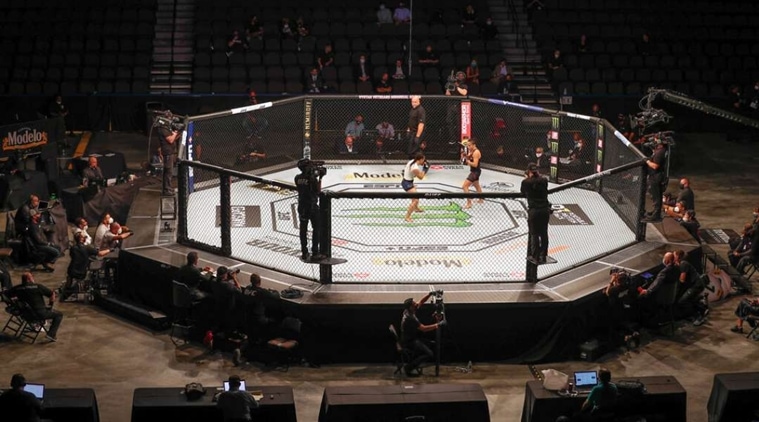 Justin Gaethje scored a surprise knockout victory over Tony Ferguson and won the interim lightweight title at UFC 249. (Source: Reuters)
Justin Gaethje scored a surprise knockout victory over Tony Ferguson and won the interim lightweight title at UFC 249. (Source: Reuters)
Just like that. Live sports returned with UFC 249 on Sunday, headlined by what was the greatest fight in the short closed-doors MMA history. Justin Gaethje pummeled Tony Ferguson to win the interim lightweight championship and set up a date with the unbeaten Dagestani champion Khabib Nurmagomedov.
US President Donald Trump congratulated his “great” friend and UFC chief Dana White for ending the two-month wait for major sporting action in America due to the coronavirus pandemic. “We want our sports back,” said Trump in a video message outside the Oval Office.
White, in turn, endorsed hosts Florida and shared that he was already swamped by calls from “other states and sports leagues”. “A lot can be learnt from what we are doing there. Not just for professional sports but sending people back to work…” White told reporters afterwards.
There were other takeaways too. One registered (pun somewhat intended) during the aforementioned 24-minute Gaethje-Ferguson slugfest. Hearing the crunching sound of bone-on-bone collision and the thwack of high-velocity strikes meeting flesh, one realised what the ‘POWs’ and ‘BLAMs’ were trying to convey in those comic panels.
In professional sports, noise is good, and commotion even better. There has, however, always been room for silence.
Between points, ‘quiet’ isn’t just welcome on tennis courts but mandatory. Golfers complain about the chattering in the background. The NFL rule book has a 900-word section assigned to dealing with crowd noise. And any cricket fan who’s watched a Ranji match knows that the leather-meets-wood sound is enough for a rush.
But has ever a sports-viewing experience been enhanced by a lack of crowd like Sunday’s UFC was?
One of the last major professional sports to press pause after growing criticism, and the first one to resume amid the similarly vocal clamour for normalcy, UFC ran its first major pay-per-view event at an empty arena in Jacksonville. Lockdown means the show was stripped of thousands of blood-baying spectators and the associated pageantry.
As a result, the action was a lot more grounded.
First, a disclaimer: Nothing can replace the jump-out-of-the-seats roar of the crowd following a knockout or a submission. While it makes for great highlights, the closed-doors UFC event presented the gritty aspect of fighting often lost in the spectacle.
Watching Sunday’s telecast, it was difficult to disassociate the fighters with the punishment they exchanged. Once derided as ‘human-cockfighting’, UFC looked every bit a sport and its extravagant gladiators looked human; none more so than Ferguson and Gaethjhe, cult favourites and two of the most violent competitors.
Each grunt and sharp exhale of breath as they landed or received heavy shots. Sounds of spitting blood, or blowing it out of their increasingly-deformed noses. The squeaks the sweaty feet made on the mat. Sounds you would hear in a boxing hall or a jiu-Jitsu gym made it all surprisingly intimate.
No crowd also meant no boos or low droning, reserved usually for periods of inaction or undercard non-stars.
There was also discernible trash-talking that would usually be missed in the cacophony. “Get him off that stool. You’re sucking wind, kid,” bellowed Ferguson at the end of the second round as Gaethje slumped in his corner.
One could also hear the real-time coaching from both corners, though it was the counsel from the announcers’ desk that helped out most fighters.
 Carla Esparza and Michelle Waterson battle in an empty arena. (Source: AP Photo)
Carla Esparza and Michelle Waterson battle in an empty arena. (Source: AP Photo)
Seated separately around the octagon, Daniel Cormier, Joe Rogan, and Jon Anik quickly learnt on the job to not talk over each other and present a coherent broadcast. But it was Cormier — former two-division champion — whose excited, loud calls were easily picked up by the fighters themselves.
Straw-weight contender Carla Esparza said that Cormier’s criticism of her for not mixing up strikes and wrestling helped her switch up the game plan mid-round. Heavyweight Greg Hardy admitted he started checking incoming kicks with his shin after hearing Cormier talk about it. Featherweight Calvin Kattar also referenced a line from DC.
“We gotta whisper a little bit, people can hear everything,” Cormier, former worlds medallist wrestler, realised during the main event.
Henry Cejudo — Cormier’s Team USA teammate at the Sydney Olympics and the gold medallist in 55kg — defended his title and announced a shock retirement. The current bantamweight and flyweight champion, Cejudo, decided to go out on top. The 33-year-old’s speech was surprisingly dialled down. Cejudo, also called the ‘King of Cringe’ for his persona of a loud-mouthed champion, spoke uninterrupted in the absence of the usual mix of cheers and jeers.
The post-fight interviews across the board were less provocative and rehearsed and more sombre and poignant. Most fighters noted the unreal situation and wished for everyone’s safety.
The bigger picture is still full of bad optics. Firstly, it’s tough for UFC to shake off the usual seediness associated with combat sports. And White’s closeness to Trump and the duo’s rush to get things back on track has long been criticised.
Brazilian fighter Jacare Souza and his cornermen tested positive a day before the event and the fight had to be scrapped. The UFC is looking at the positives and White said that the positive case only spoke of the stringent “1100+ tests” they’ll be doing for their three events in eight days. It was, however, still uncomfortable to see announcer Joe Rogan shake hands and stand in close vicinity of the fighters during the interviews.
How big of a home run the UFC gambit proves to be will be clear in the following days. On Sunday, at least, the symphony of violence hit all the right notes.